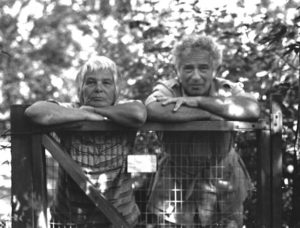Mary Oliver’s voice, vision, and words are beloved around the world and uniquely tied to Provincetown, where she lived for many decades. Her poems have introduced countless readers to ponds, turtles, mussels, white-sided dolphins, and geese. For those of us who live here, there’s a thrill in seeing our fox, our bayberry in poems that are celebrated so widely. Many of her lines echo in my mind when I’m in the presence of bear tracks, grasshoppers, or skunk cabbage.

Oliver’s poems have served, too, as a welcoming hand to those who might otherwise have been wary of poetry. They are read in yoga classes and at funerals, weddings, graduations, and so many other moments of significance in people’s lives. Even though someone might not be a “poetry reader,” it’s quite possible they’ve got a book of Oliver’s on a shelf. This gives me endless joy.
When I first moved to Provincetown, I lived across the street from Oliver and her partner, Molly Malone Cook. We talked often about dogs (Oliver advised me to call my sweet pit bull mix a “Brooklyn terrier” to shelter her from stigma), whales, and boats. We never talked about poems. It was a pleasure to talk about tides or mushroom foraging. To be, really, neighbors.
Would I like to have talked poetry with Mary Oliver? Absolutely. When I was a young writer, she was one of my heroes. But so many clamored for her in that way. I was grateful for what I had. (I did have a plan to take her neatly tied stacks of newspapers, set out for recycling, and use them to make a paper boat, but that never came to fruition. I think that’s for the best.)
For this month’s column, I asked Jessica Smart to “Mad Libs” a poem — that is, to take the bones of a published work and make it her own, swapping out nouns, verbs, and adjectives — all but the punctuation of the sentences themselves. Jessica and I work together on the Dolphin Fleet whale watch, where I am a naturalist and she is a captain-in-training (the first woman captain, I must add, an honor that I am both thrilled to report and also dismayed, in 2022, to have to note).
On the boats, Jess and I often talk about what we’ve been reading, the animals we encounter outside of work (whether hummingbirds or donkeys), or any of the other things that inspire in us a love of this place. I sent her a handful of poems I thought might be interesting, and then she went silent. About a week later, she emailed to say she was working on a poem but struggling.
“In the last five years, I think the extent of my writing has been filling out the logbook,” she wrote. Logbooks kept on boats list the facts: accounts of weather, personnel on board, fuel use, and oil changes.
Five days later, I heard from her again: “I’ve copied and pasted two poems I did, both by Mary Oliver.”
The poems Jess chose were not among those I sent her. Both were beautiful, but the one we decided to include here was her tracing of Oliver’s “In Malaysia.” I love that Jess took one of the few Mary Oliver poems that is not set here and brought it back to the Cape.
After working a whale watch charter that carried just under 200 sixth-graders from Nauset Regional Middle School (listen: we love kids on a whale watch, but the amount of gum, chocolate, and other nasty food debris we had to clean off the deck was epic), Jessica and I sat down to talk about her experience writing.
When Jess read the poems I sent her, nothing resonated. They were too complicated, too “not me,” as she put it. So, she turned to the books on her shelves. She had two books of poetry: one by Mary Oliver and another by Charles Bukowski. She likes Oliver for her attention, she said. And Bukowski for his swagger.
Jess said she loved the way “In Malaysia” kept offering images: this, then this, then this. Glimpses that add up to a beautiful whole.
She had been appreciating the hummingbirds in her yard; she loves to sit in a hammock on her porch in her favorite season, spring, and watch the hummers buzz. This was her poem’s opening.
It struck me that this poem is all joy. It plays with the delightful (and annoying) details of spring. As she wrote, Jess said, she was thinking of a coworker’s experience of seeing North Atlantic right whales for the first time off Herring Cove. The joy in that, she said, was not only about these endangered whales gracing us with their presence but also about the way folks made their visit a party. People were watching and tossing frisbees, she said. It felt like the entire town was emerging from winter’s hibernation.
When I asked Jess what her favorite part of the poem was, she said, “The lilacs. Springtime is my favorite.” Which, we agreed, is ironic, given how fleeting that time of fragrance is.
What I’m most struck by is the way Jess’s poem chronicles the specific details of Cape Cod’s spring, from peepers to schoolies (small gangs of striped bass). Spring, here, is a calm before the storm. It’s when we see the world awakening but we are not yet consumed by the demands of our seasonal work.

